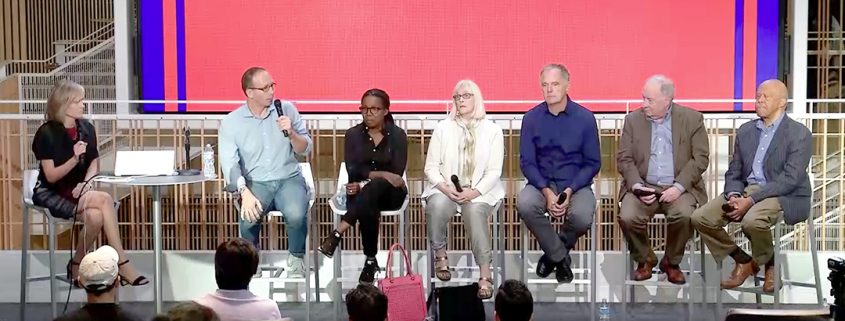Panel talks election, future of journalism
Students and faculty struggled to come to terms Wednesday with the election of Donald Trump as the 45th President of the United States, as numerous groups and individuals expressed uncertainty and concern over the country’s future.
A panel featuring Annenberg School for Communication and Journalism Dean Ernest Wilson III, School of Journalism Director Willow Bay, School of Communication Director Sarah Banet-Weiser, Vice Dean Philip Seib and professors Burghardt Tenderich, Judy Muller, Miki Turner and Gabriel Kahn met in Wallis Annenberg Hall Wednesday afternoon to discuss how the election will impact both the journalism industry and the millennial generation as a whole.
Professor Tenderich called on the audience to understand their privilege as a college educated group and encouraged greater empathy toward Trump supporters.
“It’s the elite talking to the elite,” Tenderich said of mainstream liberal political thought. “The worst thing we can do is blame the people who voted for Trump yesterday. We need to understand we live in a bubble.”
Muller went on to point out that in light of Tuesday’s results, Americans will face a political system dominated by one party, the Republicans. She said that this served as an “awakening” for how important the jobs of journalism and communication students are when it comes to informing the public about political events.
“I’m talking about being the watchdog,” Muller said. “You will be going out at a time when all branches of government are controlled by one party. This is what the press was born to do.”
In light of this, students asked for specific direction on how to express their discontent with the outcome of the election.
“As a child of the ’60s, I think there’s nothing wrong with peaceful protest,” Muller said. “I think it’s a very valuable exercise and I don’t think it’s useless at all.”
Banet-Weiser too encouraged action. She noted that because of the election results, she struggled to speak without crying for much of the morning and asked students to mobilize based off their frustration.
“Use your anger,” she said. “Do something. Organize. Get in a group.”
Wilson followed by encouraging mass unity among student groups, though noted USC’s campus lacked vocal activism.
“Part of the challenge is that you’re on a campus that doesn’t get real excited about political stuff,” Wilson said. “There has been a lot of demonstrations across the country, we really haven’t had that.”
The panelists also highlighted the mistakes made by the mainstream media during the election, especially in failing to recognize and report on the problems facing the so-called “silent majority,” whose strong voter turnout was ultimately responsible for pushing Trump to the presidency. According to Seib, it was this oversight that was responsible for boosting Trump to his unexpected win.
“In terms of covering what America is, journalists will have to give a lot of thought on exactly what criteria they’re looking at,” Seib said. “Obviously, there’s a tremendous amount of anger out there, a tremendous amount of fear, and the news coverage, for the most part, missed all of that.”
While Seib said that Trump’s victory Tuesday night showed the deep disconnect between mainstream media and Trump supporters, several students added that it also highlighted the divide between Americans that was increasingly exposed during the 2016 election cycle.
“I don’t think I’ve ever been a part of an experience related to our country where people are feeling so dejected, feeling so lost and hurt,” said JT Arowosaye, a junior majoring in broadcast and digital journalism. “But in stark contrast, there are people who are elated, and so happy, and so thrilled, and fathoming that disconnect between people right now is hard for me. I don’t know how to communicate with people who voted for someone who I feel puts my life and my family and friends’ lives in jeopardy, but I guess I have four years to figure that all out.”
Darrell Florence Jr., a junior majoring in business administration, said that he believes students are not doing enough to foment change and bridge this divide, largely due to a lack of communication between different communities on campus and a failure to ask the questions needed to catalyze meaningful conversations.
“We’re trained to ask questions that sound intelligent but don’t really get to the root of the problem,” Florence said. “We need to be asking ourselves and asking each other, ‘How do we get along and fix this together?’ We’re not doing enough.”

